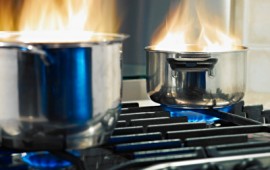Tips to a Safer Home for Home Safety Month
Author: Shannon Miller Lifestyle

How safe is YOUR home? Do you know? Let’s start with a Home Safety Tour.
Living room Safety Check:
- Check your power and extension cords. Are there wires hanging low enough for your kids to grab? Tuck wires away. Hang your television with wiring close to the wall, not out where kids can tug them. Appliance power cords could tempt your children to pull an appliance over on themselves or even electrocute themselves.
- Check your electrical outlets. Are they all covered with safety plugs if not in use?
- Check your large furniture. If you have high bookshelves, are they secured to the wall? If not, young children can climb on the shelves or pull on them, and the furniture can land on the child.
Kitchen Safety Check:
- In a household with young children, safety lock cabinets and the refrigerator. Children can end up inside a cabinet or refrigerator if they are young and curious, or they can pull dangerous materials out of the cabinets.
- Check how well your appliances work. Check for exposed wires. Do you notice malfunctioning in any appliance? If so, it’s probably time for a repair or change.
- When using the range or cooktop, make sure all pot and pan handles face away from the front. A child can grab and pull anything that they see hanging off the front of the stove.
- Keep glassware and other dangerous kitchen utensils in the higher cabinets.
- Safety Lock knife drawers.
Laundry and Cleaning Space Safety Check:
- Keep all cleaning chemicals out of reach of a child.
- Lock all dangerous chemicals in an enclosed cabinet.
Bathroom Safety Check:
- Keep cleaning chemicals out of the bathroom, in a safety locked cabinet, or on a very high place.
- Always monitor children in the bathroom. Never leave a child in the bathtub alone.
Bedrooms and other living space Safety Check:
- If your house was built before 1978, check the paint for lead content. You can get a lead testing kit at any home goods or home improvement store, like Home Depot.
- Have a working smoke detector by each bedroom. Not sure when you checked it last? How about TODAY? Then, decide which day of the month you will check them, and put it on your calendar every month.
- Install a carbon monoxide detector. Carbon monoxide is silent, scent free, and deadly. Any home can have a carbon monoxide leak, and you would not know until members of the household start having flu-like symptoms. Many people misdiagnose it as the flu, but it could kill you and your children if not handled quickly.
- Do you have a gun? Lock it away in a gun locker, with all ammunition stored separately. Never store a loaded gun.
Outside Your Home Safety Check:
- If you have a swimming pool, make sure it is fenced and locked behind a gate. All children should be trained on pool safety and closely monitored when outside in the pool area.
- In garages or shed spaces, have all dangerous tools and sharp objects locked in a tool box, out of children’s reach. Keep fuel containers and chemicals out of reach as well.
- Never leave a car or gas vehicle running inside of an enclosed space.
And don’t forget Hurricane Safety Check!
Hurricane Season is here.
- The hurricane season in the Atlantic is June through November, and yes, they are already active this year. Have a plank board cut to fit every window of the house. Mark them per window or number them starting from the front of the house and working clockwise around the house. Keep them stored away in case you need to put them into your window space as a hurricane approaches.
- Have a plan to store all large outdoor items, like outdoor furniture and grills, in case of a hurricane.
- Take pictures of your home and all of the rooms in your home, including your most expensive items. Save the pictures to an online server, such as Shutterfly. Your insurance company may require before and after pictures with your claim if something happens to your property.
- If you live in a coastal area, have an emergency plan in place.
- Keep a portable lock box containing with your most important family and insurance documents that you can grab and take with you if you have to evacuate your home in an emergency.
- Select a safe temporary location (like a hotel or motel or relative’s home), and let family know where you plan to go if you have to evacuate your home, and let others know if you change your plan.
- Have a freshly-stocked first aid kit in your car, and keep gas in your car in case you are suddenly evacuated.
SML TIP: These may sound like things many seasoned veteran moms already know about, but don’t you remember the first time you had an emergency with your little one? At least you can prevent many more from happening by having a game plan for when an emergency happens and you are there!
If you have a good home safety tip that we have missed in our list, please add it as a Comment to this article, so we can share it with other readers.
